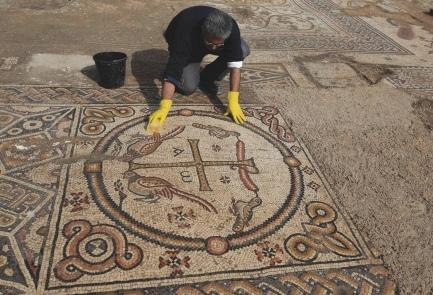Ancient church uncovered in southern Israel
Thursday, 23. January 2014 - 19:05
According to Varga the "spectacular basilica structure" is 22 meters (72 feet) long and 12 meters (39 feet) wide. At the front was an open yard, with a white mural floor and a well. As was customary at the time, marble columns divided the structure into three sections. One of the columns was found in secondary use in a building from the Muslim period.
Following the find, authorities have decided to preserve the site for future generations. It will be opened to the general public on Thursday and Friday. The antiquities authority is making plans to remove the mosaic floors to put them on display.
Varga believes the church was a regional spiritual center that served many communities on the road between Ashkelon and Jerusalem.
Yori Yalon
Source:

